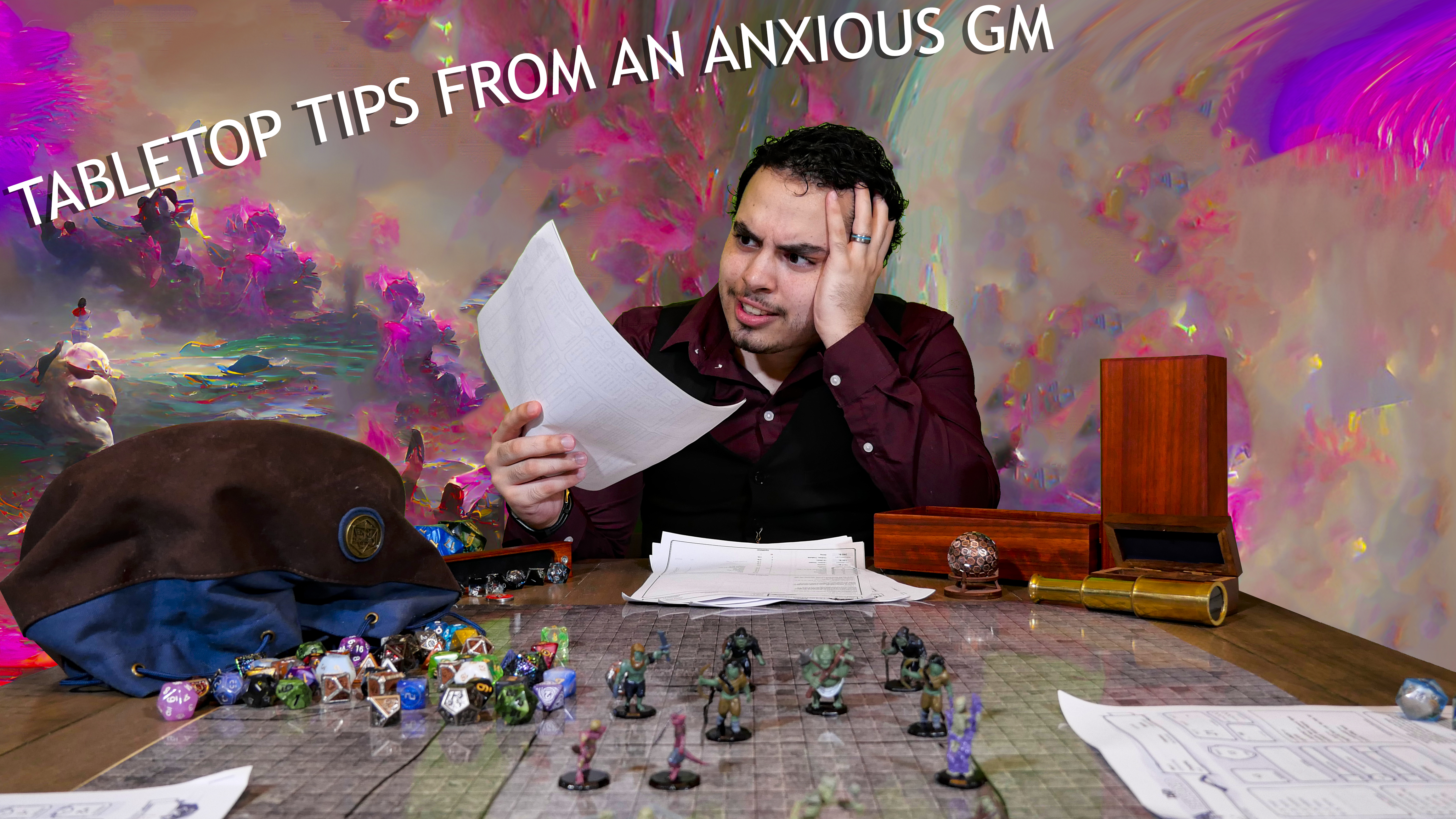How do I play DND? Tabletop tips from an anxious GM
Setting up your character sheet is one thing, but how do you really play D&D?

“How do I play D&D?” is a question that’ll have GMs across the world raving about mechanics for hours. Yes, you can shove a rulebook, dice, and a character sheet in front of someone, but they won’t understand the magic of roleplay until someone breaks down that anything is possible. As someone who struggles with anxiety and depression — a combo that is less than ideal for a journalist or a game master juggling seven different players in a six-hour Dungeons & Dragons game — I want to untangle this question with my experience from a different angle.
In this week’s column of Tabletop tips from an anxious GM (all of which can be found on our DND tips hub), I’ll be answering a question that has been posed by many of my new players at the start of their journey into D&D. They might not necessarily ask me “How do I play D&D?” straight up — some do, but not all. But the core concept of the game is skewed by thinking about D&D, or any TTRPG, as a game with typical rules and limits.
New and old players, the rulebook is just a suggestion — not a limitation. If you have a good GM, they’ll let you do some wild stuff. Let me show you what I’m talking about. This is how to play D&D.
TL;DR
Think of D&D or any TTRPG like a story, not a game. You’re writing it with your GM and fellow players, so ignore the rules (for now). You don’t need to know how to play D&D mechanically; you just need to grasp the core concept of roleplay. You are acting, and you’re playing the part of that beautiful character you created. So what would your character do at that moment? Are they impulsive? Maybe they jump for the mugger’s weapon. Are they charismatic? Maybe they talk the bank robbers down instead of whooping their asses. Role-playing games are narratives — so play it like you’re one of the protagonists.
How to play D&D — An in-depth look
I can’t tell you how to play D&D because you can play it however the hell you want. For the uninitiated, that may seem very confusing. The Player’s Handbook and your character sheet are your tools, not your limits. If you’re looking at your character sheet and are confused about what you can and can’t do, don’t worry about it. Ignore the sheet. Rules and such can be learned on the go. In the beginning, you want to focus on your GM and react to what they are describing. It’s your GM’s job to guide you along rules-wise. It’s your job to fully inhabit your character — think of it like acting.

For example, one time I described a territorial creature approaching my players, but they didn’t speak its language and didn’t want to hurt it, but what could they do? There’s nothing on their sheet that describes how to handle this situation. Some weren’t spellcasters, so all they had were weapons. One of my players asked, “what can I do?” I told them to stop looking at their sheet and think about what their character would do outside of the rules and abilities that the game has given them. Then they decided to drop their weapons, and this quickly disengaged the creature’s aggression.
You have to think about TTRPGs less like a game and more like a story — a narrative that you and the GM are weaving together. Your abilities, features, and skills serve as tools for your characters. And even those features aren’t limited by their directly written use. For example, in a game where I played a Way of the Ascendant Dragon Monk, I could punch people with my fists and inflict fire damage. That’s all it says about that ability, but I used that knowledge to roleplay that I could create a small fire in my hand to shed a bit of light in a dark place. A good GM will let you go beyond the rulebook and tinker around with your abilities.
Sign up to receive The Snapshot, a free special dispatch from Laptop Mag, in your inbox.
Additionally, you can flavor your abilities however you like to match the idea of your character in your head. For example, my Warlock’s Eldritch Blast took the form of spiked rocks that formed in their hand and flung at an incredible speed (typically, Eldritch Blast is described as a beam of crackling energy).

One of the reasons I love new players so much is that they think outside of the box. Veteran players will look to their abilities and resources to min-max their contribution. However, a good GM will reward you for your creativity, like using weapons or hazards in the environment to your advantage — a veteran player probably wouldn’t because it most likely won’t do as much damage as their shiny +2 magic weapon. But in my latest D&D session, I let one of my players disable a fire-breathing Pit Fiend statue with a cast-iron pot because it was cool as hell.
With D&D or any TTRPG, you have to bring yourself back to your five-year-old self, where your imagination would run wild with all sorts of things and you’d “play pretend.” You were roleplaying back then, and you’re roleplaying now — nothing has changed. There’s just a rulebook to give you a few extra ideas, and to keep the peace between players.
Think about your character — their personality, ideals, bonds, and flaws — and fully inhabit them. It’s helpful to bring your personal experiences into the character. I use TTRPGs as an outlet to deal with all of the trauma I've experienced throughout my life, so every one of my characters has a piece of me, whether it's my rage, fear, anxiety, or beliefs. My favorite character, Kaz, is a half-elf pirate captain sorcerer trying to bring his daughter back to life. I have never experienced being a half-elf, a pirate, or a sorcerer. But I know what it's like to love someone so much that it hurts, and I know what it feels like to be a fiery hot ball of anger. Kaz is my rage. I cling to those real-world experiences to fuel his journey to save his daughter. There is nothing he wouldn't do, even risk the lives of his party and everyone in the entire universe. Yes, that's canon, and it was because of his motivations that he managed to ironically save the universe (except his daughter — still working on that one).

I hope this helps new players out there who may be struggling with similar issues. If you liked this column and want to see it continue, you can send me your own questions concerning mechanical, narrative, or social issues in the tabletop gaming space. You can email me at rami.tabari@futurenet.com or find me on Twitter.

Rami Tabari is the Reviews Editor for Laptop Mag. He reviews every shape and form of a laptop as well as all sorts of cool tech. You can find him sitting at his desk surrounded by a hoarder's dream of laptops, and when he navigates his way out to civilization, you can catch him watching really bad anime or playing some kind of painfully difficult game. He’s the best at every game and he just doesn’t lose. That’s why you’ll occasionally catch his byline attached to the latest Souls-like challenge.
